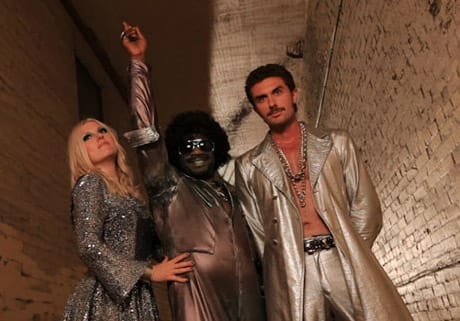Disco, the genre of music most regretted, brings to mind images of big hair, polyester fashions, glitter, unflattering bulges and Saturday Night Fever. Though relatively short-lived, it was an infectious musical and style phenomenon of the '70s and continues to influence culture today.
Jamie Kastner's The Secret Disco Revolution takes things a step further than most disco analyses, positing that the genre "became the voice of the aspirational," breaking down barriers for the liberation movement of women, African-Americans and gay men alike.
Interviewing anthropological and cultural experts, along with some of the biggest names from the heyday of the '70s, Kastner paints a picture that highlights some of the triumphs disco music produced. Dance clubs lured people onto euphoric dance floors to groove together, blending gay, straight, blacks and whites into a harmonic place free from judgment. Disco music muscled its way into the Billboard Charts, bypassing the need for radio and proving that club airplay could influence record sales.
A slew of former disco greats make an appearance in the film, including Thelma Houston, Gloria Gaynor and Martha Wash, affording viewers a firsthand recounting of the era they once reigned over. And no documentary about the '70s would be complete without anecdotal stories of sex and drugs at a time when both were abundant and running wild.
One such anecdote is about Donna Summer's 20-minute song, "Love To Love You Baby," which became the critique of formerly humdrum three-minute sex, helping to foster the sexual revolution at a time when the female orgasm was gaining importance, or more accurately, acknowledgement.
Fun, peppy and vibrant visuals, along with compelling interviews, make this an entertaining film to watch. Unfortunately, the framing device of "The Three Masterminds," which is essentially three actors in disco garb that are used as physical proponents of the movement, is confusing and off-putting. Letting the text speak for itself, with a bit of clever editing, would have been far more effective.
Kastner follows the timeline right to the end when the "Disco Sucks" movement stepped in and put rock'n'roll back in charge. The implication is that this was rooted in homophobia and racism.
The one thing Kastner doesn't seem to clear up is whether disco music was, in fact, a political movement or just a way to check your mind at the door and party hard. The surviving men of the Village People would like you to think it was the latter.
(Kinosmith)Jamie Kastner's The Secret Disco Revolution takes things a step further than most disco analyses, positing that the genre "became the voice of the aspirational," breaking down barriers for the liberation movement of women, African-Americans and gay men alike.
Interviewing anthropological and cultural experts, along with some of the biggest names from the heyday of the '70s, Kastner paints a picture that highlights some of the triumphs disco music produced. Dance clubs lured people onto euphoric dance floors to groove together, blending gay, straight, blacks and whites into a harmonic place free from judgment. Disco music muscled its way into the Billboard Charts, bypassing the need for radio and proving that club airplay could influence record sales.
A slew of former disco greats make an appearance in the film, including Thelma Houston, Gloria Gaynor and Martha Wash, affording viewers a firsthand recounting of the era they once reigned over. And no documentary about the '70s would be complete without anecdotal stories of sex and drugs at a time when both were abundant and running wild.
One such anecdote is about Donna Summer's 20-minute song, "Love To Love You Baby," which became the critique of formerly humdrum three-minute sex, helping to foster the sexual revolution at a time when the female orgasm was gaining importance, or more accurately, acknowledgement.
Fun, peppy and vibrant visuals, along with compelling interviews, make this an entertaining film to watch. Unfortunately, the framing device of "The Three Masterminds," which is essentially three actors in disco garb that are used as physical proponents of the movement, is confusing and off-putting. Letting the text speak for itself, with a bit of clever editing, would have been far more effective.
Kastner follows the timeline right to the end when the "Disco Sucks" movement stepped in and put rock'n'roll back in charge. The implication is that this was rooted in homophobia and racism.
The one thing Kastner doesn't seem to clear up is whether disco music was, in fact, a political movement or just a way to check your mind at the door and party hard. The surviving men of the Village People would like you to think it was the latter.
